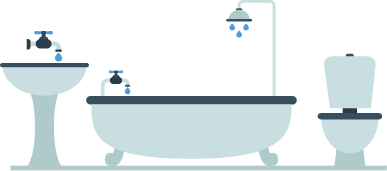Let’s do this together!
SEWER and SEPTIC BEST PRACTICES
CONSERVE WATER!
When heavy water use and rain bring in more than systems can handle, this directly causes overflow that carries contamination.
Use Water Efficiently to Reduce System Stress
The average indoor water use in a typical single-family home is nearly 70 gallons per individual, per day. Just a single leaky or running toilet can waste as much as 200 gallons of water per day. All of the water a household sends down its pipes winds up in its septic system or the municipal sewer system. The more water a household conserves, the less water enters these systems.

Install high-efficiency toilets
Toilet use accounts for 25-30% of household water use! Older toilets can use 3.5- to 5-gallons of water per flush, while newer, high-efficiency toilets use only 1.6 gallons or less. That water savings adds up!
Install faucet aerators & high-efficiency showerheads
Use clothes and dish washing machines smartly
- Adjust water to load size; run full loads
- Spread washing over the week
- Wash with an ENERGY STAR rated appliance

KNOW WHERE THE WATER IS GOING!
Rainwater and wastewater are meant to go to different systems; avoid causing overflow of contaminated water, or unnecessary treatment of storm water!
Disconnect Illegal Connections to Sanitary Sewer Systems
Roof drains, sump pumps, and foundation drains illegally connected to the sanitary sewer system sends groundwater to the sewer treatment plant, consuming expensive wastewater treatment capacity. Property owners need to disconnect these prohibited connections or be willing to pay for future treatment plant expansions.
Report Illegal Dumping to Storm Sewer Systems
Never dump anything down a storm drain as these usually go directly to a stream or wetland area. Contact the Berrien County Health Department or the state’s 24/7 hotline at 800-292-4706 to report any illicit connections or dumping into storm sewers.
DISPOSE WASTES PROPERLY!
Be mindful of what you put down the toilets and sink and shower drains.
Properly Dispose of Waste for System Health
Whether you flush it down the toilet, grind it in the garbage disposal, or pour it down the sink, shower, or bath, everything that goes down your drains ends up in your wastewater system, and can compromise the septic or sewer system.
Only flush human waste and toilet paper…
Put wipes, feminine products, and diapers, in garbage for proper disposal.
Instead of flushing past dated pharmaceuticals…
Take them to a collection center or recycling event for safe disposal; or find the closest participating Walgreens or CVS.
Instead of chemical drain openers…
Use enzyme-based, septic-safe drain openers.
Instead of using a garbage disposal…
Scrape any food scraps into garbage (or better yet, compost).
Instead of pouring cooking oil or grease down drains…
Cool, pour into a non-breakable container, then dispose of in trash.
Instead of pouring chemicals and paint down drains…
Stir clay cat litter into any cans of latex paint until thickened, then dispose of can in the trash. Oil-based paints are considered hazardous waste and must be taken to a recycling center.
KEEP HOME SEPTICS HEALTHY
Avoid system failure.
If You Are on a Septic System… Inspect and Maintain
Your septic system contains a collection of living organisms that digest and treat household waste. Efficient water use improves the operation of a septic system and reduces the risk of failure and expensive replacement.
Regular System Inspection
Contact a professional to inspect at least every 3 years.
Regular System Pumping
Your septic tank should typically be professionally pumped every 3 to 5 years.

Our Action Plan for Cleaner Water & Better Beaches
IMPROVE & MAINTAIN Systems Now, PROTECT Clean Water Long Term
HOMEOWNERS & BUSINESSES
ON SEPTIC SYSTEMS

- Adopt “Septic Best Practices” to reduce system stress
- Repair/Replace/Maintain septic system
- Learn where water flows from your property
PROPERTY OWNERS ALONG WATERWAYS & WETLANDS

- Add or maintain plantings along banks to avoid erosion
- Restore and protect wetlands
- Learn where water flows from your property
HOMEOWNERS & BUSINESSES ON SEWER SYSTEMS / CITY INFRASTRUCTURE

- Adopt “Sewer Best Practices” to reduce stress on system
- Implement “Urban Water Management Practices”
See https://sustainoxcreek.org/improve - Get involved in local government forums
- Support bills/millages to improve and maintain infrastructure
GOVERNMENT OFFICIALS &
DRAIN COMMISSION

- Replace failing wastewater collection system infrastructure
- Identify and correct illegal dumping or connections
- Identify and correct failing septic systems
- Identify and correct problem road/stream crossing sites
- Enact a septic inspection time of sale ordinance
- Enact/improve water quality protection related ordinances
- Improve zoning maps to locate intensive land uses appropriately
- Protect conservation lands and wetlands
- Maintain buffer areas, streambanks, and wetlands
